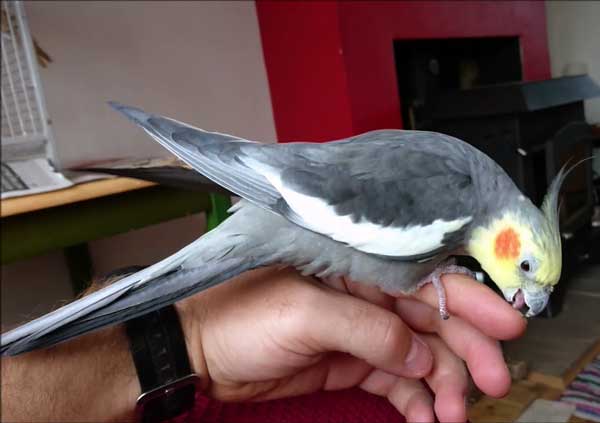Budgies can digest fermented dairies like cheese, so yes, you can feed low-fat cheese to your budgie. But don’t consider it a staple food for your budgie’s diet. You can treat it as an occasional snack that could be offered in moderation.
So, Can budgies eat cheese? Yes, they can. Budgie owners are generally concerned with dairy products because budgie’s gut isn’t designed to digest lactose in the milk and could cause serious digestive issues. But cheese undergoes fermentation that breaks down the lactose and improves digestibility. So it’s safe for budgies to consume such dairy, but since cheese is high in fat, you’ve to offer them occasionally in a small amount.
There’s more to know about feeding cheese to your feathered friends, such as the optimal amount, health benefits, risks, and the best cheese for budgies. Let’s find out these details down below.
Can You Feed Cheese to Budgies
You can feed your budgie cheese, but since it comes in wide varieties, you should know which type of cheese you should offer. Cheese is a calorie-dense dairy product with lots of fat which isn’t good for your parakeet. So you’ve to go for a low-fat version for the pet budgies.
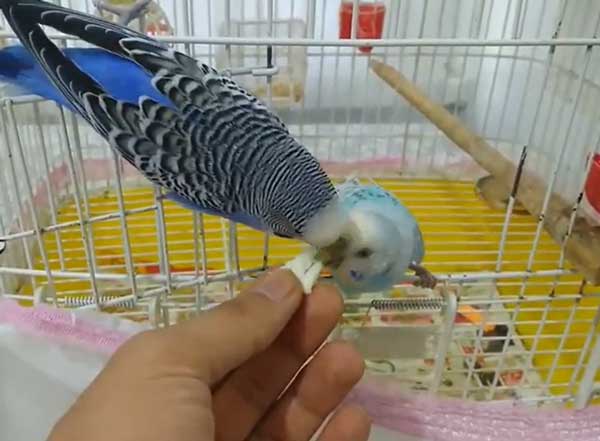
Luckily, some excellent variants are available to low-fat and low-lactose cheese that you can offer to your parakeet in moderation. Some of the best cheeses for parakeets include:
- Mozzarella Cheese: Mozzarella cheese contains the least amount of lactose, and it’s also the easiest one available out there. You can give it to your parakeet sparingly, and he’ll digest it fairly easily.
- Cottage Cheese: It’s probably the best cheese you can offer to your budgie. It’s one of the dairy products that doesn’t contain lactose, hence safe for your budgie. But you should still provide it in moderation.
- Parmesan Cheese: It’s a hard cheese with low lactose. That’s why it’s popular among many bird owners. Some budgie owners like to serve it to their pet bird by mixing it with some other budgie foods.
- Cheddar Cheese: Cheddar is also a relatively harder cheese with a milder flavor than budgies tend to like. But it’s high in sodium; you’ve to offer it in small quantities.
Yeah, budgies can eat cheese, but that doesn’t mean they can eat all kinds of cheese. Cheeses such as cream cheese should be avoided that utilize unfermented dairies excessively and contain lactose largely. You should also avoid feeding them sharp flavor cheeses (that are aged for long) as they can cause digestive issues.
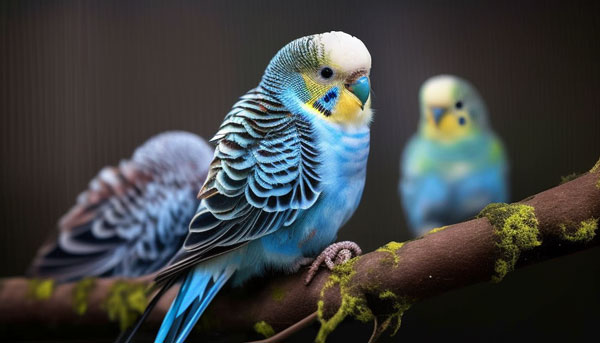
Healthy cheese contains calcium, protein, and good fat, which could benefit your budgie’s bone development if offered moderately. Since it’s calorie-dense and high in carbohydrates, excessive consumption can also deposit extra fat. So while you can feed budgies cheese, make sure to give the right one in the right manner.
New Plymouth Vet Group suggests that dairy products like cheese should be consumed in moderation. According to them, cheese should be considered “junk food”.
Do Budgies Like Cheese?
Yes, budgies seem to enjoy certain types of cheese and consider it an excellent treat. It’s a delightful snack that most birds, including budgies, relish. They prefer stale and hard pieces of cheese like parmesan and cheddar cheeses. The mild flavors like American and mild cheddars are most favorite to budgies.
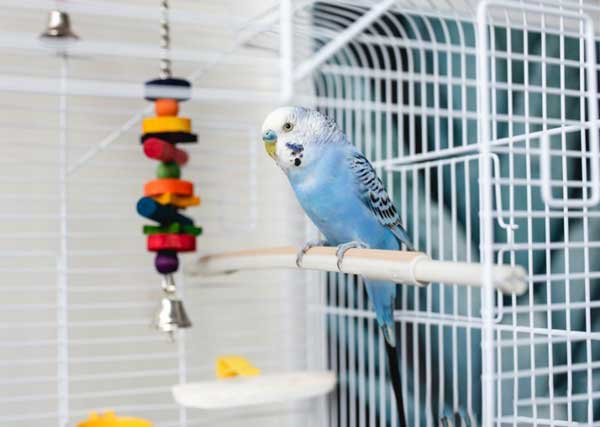
Budgies don’t like soft cheeses like cream cheese. Nonetheless, you shouldn’t offer too much of even their favorite one as excessive and frequent consumption can upset the stomach severely.
Health Benefits of Cheese for Budgies
Cheese could be an incredibly nutritious food for you budge if fed in a moderate amount. The health benefits of cheese for budgies include:
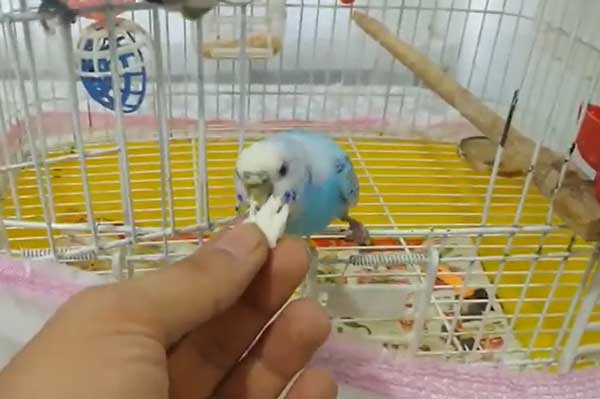
Makes Bones Healthy
Cheese is an excellent source of calcium minerals for budgie’s strong and healthy bones. It also includes Vitamin B, which helps budgies absorb calcium.
Provides Healthy Fats
Cheese provides healthy fats (not harmful ones) to budgies and keeps them full. These fats are considered beneficial because they help budgies absorb different vitamins. But again, make sure you’re feeding a tiny quantity of cheese once in a while.
Boosts Immunity
The researches show that cheese is a carrier of good bacteria called probiotic that boosts immunity in humans and birds. So you can expect your budgie to combat better with infections by having a little bit of cheese once in a while.
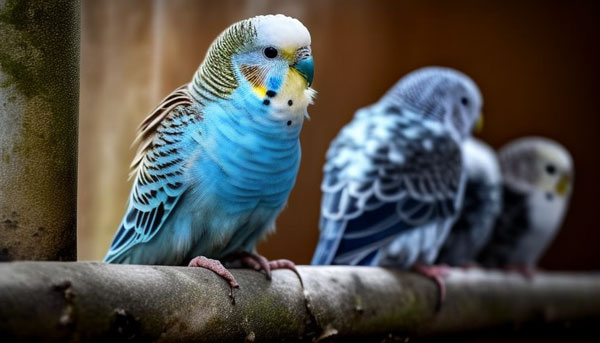
Provides Necessary Protein and Vitamin
If you see your budgie’s muscular tissues shrinking, it’s probably because they’re lacking in protein. Cheese is high in protein and can add excellent value to your bird’s diet to make them stronger. Cheese is also rich in Vitamin B12, an essential mineral for producing red blood cells in birds like budgies to help them become more playful.
Risks of Cheese for Budgies
Budgies are lactose-intolerant, so any food containing lactose can harm budgies. The cheese is a fermented dairy that makes lactose in smaller quantities tolerable to birds. However, it’s associated with different risks and can harm your budgie under the following conditions:
- Excessive consumption can cause serious stomach upsets to your budgie and lead to death.
- Some budgies could face some indigestion even with a small amount of cheese intake.
- If flavored cheese contains ingredients like onion or garlic, it could be toxic to budgies.
- While choosing cheddar cheese, make sure it’s milder and not aged for long because sharper cheddars can cause digestion issues to budgies.
- Beware of soft, moldy, or rotten cheese as it can cause serious illness to budgies.
How much Cheese Should Budgies Eat?
If you’re wondering what’s a safe amount of cheese a budgie can eat, most experts say you should try with a thumbnail amount in one serving. And regarding the frequency, this tiny amount of cheese once or twice a month is enough to provide health benefits for the cheese to your parakeet.
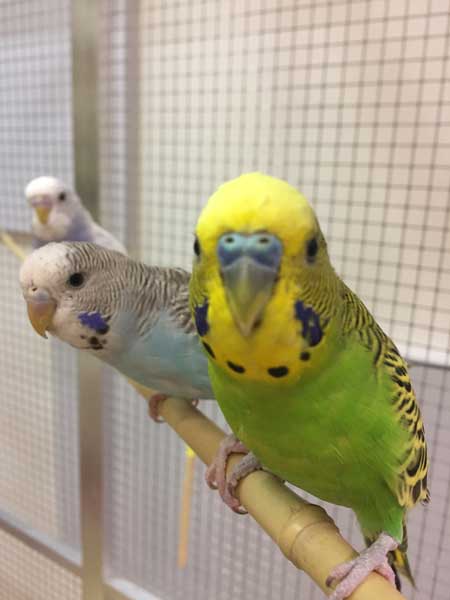
But when they’re in the breeding stage or growing feathers, you can give a small quantity of cheese once a week. They need proteins, lipids, and calories during that time, which cheese can fulfill.
Can you feed Cheese to Baby Budgies? If so, how?
Yes, you can feed cheese to baby parakeets, but you’ve to be careful about a few things. Like you must offer them hard and stale cheeses that are made without toxic materials. Homemade cheese (see some recipes) with a milder flavor and not aged for long is what you should choose for the baby budgie. Offer a very tiny amount, less than a thumbnail, once a month to be on the safer side. According to VCA animal hospital, dairy products should be consumed in moderation, as birds are lactose-intolerant. So, you should not give your baby budgies too much of cheese.
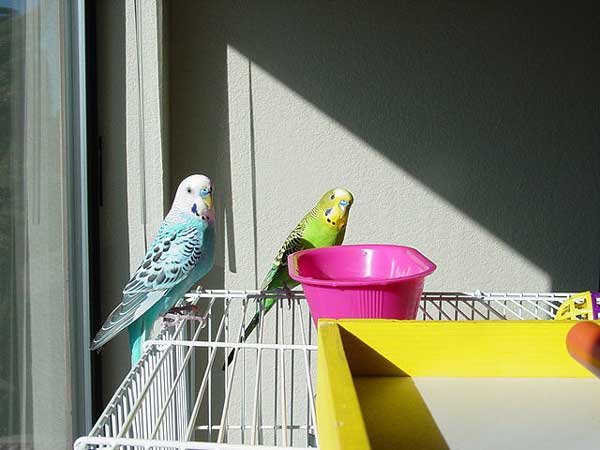
How do you prepare cheese for budgies?
To prepare cheese for budgies, consider a small portion of basic cheese flavors like cheddar and cottage. Cut small pieces of these hard-textured cheese, or you can also shred or grate them.
You can serve them alone in your budgie’s feeding station or mix them with other usual food items like seeds, salad vegetables, or fresh fruits. The mixture can also minimize the ill effects of cheese.
Video Of a Budgie Eating Cheese
Check out the video below where a parent budgie couple is enjoying cheese offered by their owner.
FAQs
Let’s get some more FAQs related to cheese answered here.
These foods contain processed chemicals and additional salt and don’t offer any nutritional value to the budgies. So it’s better to avoid giving your budgie foods like cheese crackers, puffs, or balls.
Generally, non-dairy or vegan cheese is safer than traditional cheeses for budgies. However, you should still offer it in a small amount to avoid any risk.
If your budgie eats an excessive amount of cheese, like a larger piece, it’s likely to get stomach aches and different digestive issues. Even you may have to rush to your vet for your budgie’s treatment.
Final Words
Budgies can eat cheese, and it’s perfectly safe for them when taken moderately. But it can’t be a part of your parakeet’s regular diet; you can only consider it as an occasional treat for your pet budgie. Follow the article’s guidelines for feeding your little friend the right cheese. As we’ve said, choose hard-textured cheese with a mild flavor and shouldn’t contain any added chemicals or flavors. Moreover, it shouldn’t be moldy or rancid.
If you can choose the right cheese and offer it in the right manner, you can avoid its ill effects on your budgie. Cheese is incredibly nutritious and contains calcium, protein, healthy fats, vitamins, and other essential minerals for your budgie. But do remember, your budgie can get these nutrients by eating a tiny piece of cheese once or twice a month. So don’t be tempted to add cheese to your parakeet’s diet more frequently.
Do you know if your budgies can eat cockatiel food or cilantro? Read our articles about it to learn more.

